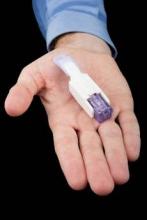HYATTSVILLE, MD. – Inhaled insulin will probably become available as a treatment option again, with a Food and Drug Administration advisory panel’s recommendation to approve an orally administered dry powder recombinant insulin formulation for the treatment of both type 1 and type 2 diabetes.
At a meeting on April 1, the FDA’s Endocrinologic and Metabolic Drugs Advisory Committee voted 13-1 that the safety and efficacy data for the inhaled insulin, delivered with an inhaler, supported approval for treatment of adults with type 1 diabetes; they voted 14-0 that the data supported approval for treatment of adults with type 2 diabetes. Panelists had unresolved concerns about safety, including the potential for lung cancer and adverse pulmonary effects, acute bronchospasm in people with asthma, and deteriorating pulmonary function over time, which they said should be closely monitored after approval.
Courtesy MannKind Corp
|
Panelists also pointed out that the results of phase III trials indicated that the inhaled insulin product was not as effective as traditional insulin, and that it would not be appropriate for all patients with type 1 and type 2 diabetes. They did note, however, that there was a need for more treatment options and that an inhaled insulin could be useful for certain groups of patients, such as elderly or disabled patients who have physical impairments and have difficulties with injectable insulin and patients who refuse to use needles – and when a dose of insulin is needed to lower blood glucose between meals.
The proposed indication for the Technosphere insulin inhalation system – which provides insulin in cartridges, delivered with the "Gen2" inhaler – is to improve glycemic control in adults with type 1 or type 2 diabetes. The system’s rapid-acting insulin works faster and has a shorter duration of action than regular human insulin or rapid-acting analog insulins, according to the manufacturer, MannKind Corp.
It is administered immediately before or within the first 20 minutes of starting a meal and is used with basal insulin in patients with type 1 diabetes, and it can be used with oral glucose-lowering medications or basal insulin in patients with type 2 diabetes, according to the company, which plans to market the product as Afrezza if approved.
The orally inhaled insulin marketed as Exubera was approved by the FDA in January 2006 for treating adults with type 1 and 2 diabetes, but Pfizer took it off the market in 2007 because of poor sales.
The FDA rejected the approval of the MannKind inhaled insulin twice before because of issues with efficacy and the device, and it asked the company to conduct two new phase III studies with a new inhaler.


